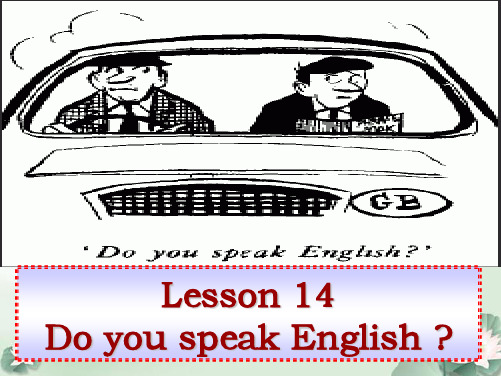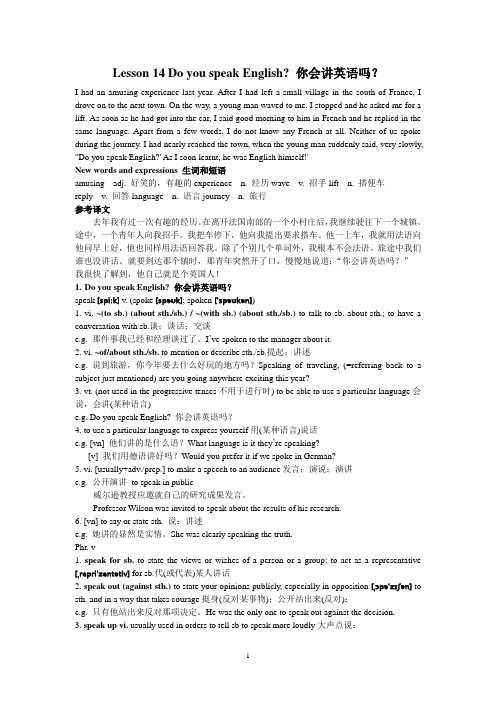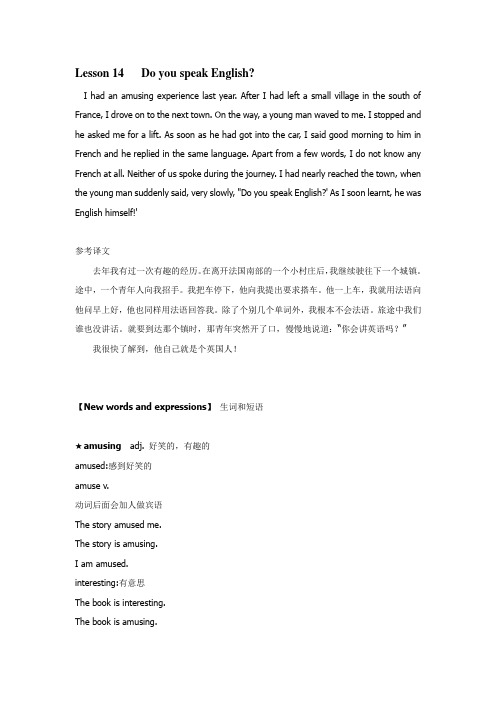新概念第二册第14课讲义超详细
新概念英语第二册课件Lesson14(共31页)

As soon as I had entered the room,I took off my coat at once. As soon as you arrive,you must call me. He has written an article in English. say good morning, hello , goodbye, sorry to sb.
Besides Tom, I invited his classmates
Tom
我邀请了汤姆和他的同学
His classmates
我只邀请了汤姆的同学, 没有邀请他本人
I invited Tom’s classmates except him.
except If you want to put
in the front of the sentence ,
Because of them thought the other was French and both of them knew little French.
Topics for discussion
1. Describe the various ways you are able to recognize a foreigner in your country.
neither of 两者都不 either of两者当中的任何一个 both of两者都
none of (三个以上)都不
Either of them will do.
Neither of the answers is correct.
I like both of them.
None of the stories are / is interesting.
(完整版)新概念第二册第14课课文讲解.doc

Lesson 14 Do you speak English?I had an amusing experience last year. After I had left a small village in the south of France, I drove on to the next town. On the way, a young man waved to me. I stopped andhe asked me for a lift. As soon as he had got into the car, I said good morning to him in French and he replied in the same language. Apart from a few words, I do not know anyFrench at all. Neither of us spoke during the journey. I had nearly reached the town, whenthe young man suddenly said, very slowly, "Do you speak English?' As I soon learnt, hewas English himself!'参考译文去年我有过一次有趣的经历。
在离开法国南部的一个小村庄后,我继续驶往下一个城镇。
途中,一个青年人向我招手。
我把车停下,他向我提出要求搭车。
他一上车,我就用法语向他问早上好,他也同样用法语回答我。
除了个别几个单词外,我根本不会法语。
旅途中我们谁也没讲话。
就要到达那个镇时,那青年突然开了口,慢慢地说道:“你会讲英语吗?”我很快了解到,他自己就是个英国人!【New words and expressions】生词和短语★amusing adj.好笑的,有趣的amused: 感到好笑的amuse v.动词后面会加人做宾语The story amused me.The story is amusing.I am amused.interesting: 有意思The book is interesting.The book is amusing.funny: 好笑的,可以指,开心的,令人开心的interesting/funny story★experience n.、体:不可数名、感受:可数名He has a lot of experience. He has a lot of experiences.Experience is the best teacher .是最好的老。
新概念第二册第14课讲义超详细

Lesson 14 Do you speak English?【New words and expressions】生词和短语amusing adj. 好笑的,有趣的experience n. 经历wavev. 招手liftn. 搭便车reply v. 回答language n. 语言journey n. 旅行★amusing adj. 好笑的, 有趣的The story is amusing. (好笑的)amused adj. 感到好笑的(要笑出声)I am amused.amuse v. 使发笑,使愉快The story amused me.funny adj. 好笑的(不一定要笑出声可以指贬义),开心的,令人开心的interesting / funny story★experience n. 经历(可数);经验(不可数)①n. 经历(可数)He has a lot of experiences.②n. 经验,体验(不可数)They want someone with a lot of experience for this job.Does she have any experience in teaching?③vt. 经验,体验Have you ever experienced anything like this?The village has experienced great changes since 1980.experienced adj. 有经验的,经验丰富的He is an experienced doctor.★wave v. 招手vt. & vi. (使)波动,(使)起伏,(使)飘扬n.波浪,波纹,波①v. 招手vt. & vi. (使)波动,(使)起伏,(使)飘扬Bill waved his hand to us and then drove away.比尔向我们挥手告别后开车走了。
_新概念英语第二册第14课 课文详解、翻译及语法

Lesson 14Do you speak English?你会讲英语吗?First listen and then answer the question.听录音,然后回答以下问题。
Did the young man speak English?I had an amusing experience last year. After I had left a small village in the south of France, I drove on to the next town. On the way, a young man waved to me. I stopped and he asked me for a lift. As soon as he had got into the car, I said good morning to him in French and he replied in the same language. Apart from a few words, I do not know any French at all. Neither of us spoke during the journey. I had nearly reached the town, when the young man suddenly said, very slowly, "Do you speak English?' As I soon learnt, he was English himself!'New words and expressions 生词和短语amusing adj. 好笑的,有趣的experience n. 经历wave v. 招手lift n. 搭便车reply v. 回答language n. 语言journey n. 旅行参考译文去年我有过一次有趣的经历。
新概念二 第14课课件

★4. language 语言,措辞。
【常用词组】 native language 本国语 mother tongue(舌头)母语。 【例句】 My mother tongue is Chinese.我的母语是汉语。 Sign language is another way to express yourself. When you don't know how to saysomething in a foreign language, you canuse your body language.
★2. reply . v. 回答,回复
【常用词组】reply to sb./sth.回复某人/事 It's very odd that she didn't reply to our letter.
【例句】 我上周一就给你发信了,但直到现在也没有得到你的任何回复,发生什么了? I wrote to you last Monday but haven't got any reply from you till now, what happened?。 请尽快回复我,谢谢! ·Please reply to me ASAP, TKS!
★3.★experience
①.经历(可数) ②.经验(不可数) vt.经验,体验 * He has a lot of experiences. They want someone with a lot of experience for this job. Does she have any experience in teaching? Have you ever experienced anything like this? The village has experienced great changes since 1980 *experienced adj.有经验的,经验丰富的 He is an experienced doctor.
新概念第二册14课-PPT课件

.
11
1.What happened when the writer was driving to a town in France?
A young man waved to him.
2.What did the young man say at the end of the journey?
Do you speak English?
1.两个动作had left 和 drove on ,都发生在过去,先发生的动 作用 过去完成时 , 后发生的动作用 一般过去时
2. in the south of 在·····南部
.
14
1.我吃完晚饭后就去散步了
After I had had my dinner, I went for a walk
2. 火车站在城市的南部
The railway station is in the south of the city.
.
15
On the way,a young man waved
to me.I stopped and he asked me
for a lift.
1. wave to sb 昨天在图书馆一个漂亮的女孩向我招手. A beautiful girl waved to me in the library yesterday.
"Do you himself!
speak
English?'
_A_s_____
I
soon
learnt,
he
was
English
.
13
I had an amusing experience last year. After I had left a small village in the south of France, I drove on to the next town.
(完整版)新概念英语第二册:第14课课文详解及语法解析

新概念英语第二册:第14课课文详解及语法解析课文详注 Further notes on the text1.After I had left a small village in the south of France, I drove on to the next town.在离开法国南部的一个小村庄后,我继续驶往下一个城镇。
(1)表示一个大范围中的某一个地方时要用介词in:Beijing is in the north of China.北京位于中国的北部。
(2)副词on紧跟在动词后面时能够表示“向前”、“继续下去”等意义:He talked on until everybody had gone.他滔滔不绝地讲到大家都走了。
I was reading when my friend called. After he had gone,I went on to read.我朋友来看我时我正在看书。
他走了以后我便继续看书。
2.I stopped and he asked me for a lift.我把车停下,他向我提出要求搭车。
名词lift的含义之一是“(给步行者)搭便车”、“免费搭车”:Last night, I had to walk home. No one would give me a lift.昨晚我不得不走回家。
谁也不愿意让我搭车。
I was lucky today. I got a lift soon after I had leftthe village.我今天运气好,离开村子不久就搭上了便车。
3.As soon as he had got into the car, I said goodmorning to him in French and he replied in the same language.他一上车,我就用法语向他问早上好,他也同样用法语回答我。
(1)表示时间的固定短语as soon as通常表示“一……就……”,即两个动词之间相隔时间非常短:Tell him the news as soon as you meet him.你一遇见他就把这消息告诉他。
新概念第二册第14课课件

nguage 1) n. 语言 speak a language 讲一门语言 spoken language 口语 written language 书面语言 a foreign language 外语 the second foreign language 第二外语 2) n.文字等以外的传达信号,人造语言 body language 肢体语言 sign language 手势语 native language 母语 My native language is Chinese. mother tongue 母语(口语中用) My mother tongue is Chinese.
• • • • • •
5. reply v. 答复;回答 reply to = answer 回应;回答 answer my question reply to my question 我会给你回信的。 I will reply to your letter.
• • • • • • • • • • • • •
• 2. experience
• • • • • • • • • • ① n. 经历(可数) an unusual experience He has a lot of experiences. ② n. 经验,体验(不可数) She has a lot of teaching experience. ③ vt. 经验,体验 Ganzhou has experienced great changes. experienced adj. 有经验的,经验丰富的 He is an experienced doctor. inexperienced 无经验的,不熟练的 eg. He is inexperienced in looking after children
新概念英语第二册课件Lesson14(共35页)

Passage analysis
• After I had left a small village in the south of France, I drove on to the next town.
• drove on 继续开车 • on 加在动词的后面表示继续 • Eg: My heart will go on. 《我心永恒》
• In the way 挡路
• He tried to get to the door, but the table was in the way.
• 他试图走近大门,可是桌子挡住了去路。 • By the way 顺便说
• By the way, how is your mother? • 顺便问一下,你妈妈怎么样?
Lesson 14
Review
• 将来进行时态 • 结构: • will be doing • 意义: • 将来进行的事情
Review
• 我们将在花园里干活。 • We shall /will be working in the garden. • 他们今晚就走。 • They will be leaving this evening.
• 1. as soon as 一… 就 • 我一到北京就给你打电话。
• As soon as I arrive in Beijing, I will call you.
• 我一到家就给你打电话。
• As soon as I get home, I will call you.
• 我一遇见他就非常喜欢他。
Warm-up questions
• 1. What do you think is happening in the picture?
(完整版)新概念英语第二册第14课

Lesson 14 Do you speak English? 你会讲英语吗?I had an amusing experience last year. After I had left a small village in the south of France, I drove on to the next town. On the way, a young man waved to me. I stopped and he asked me for a lift. As soon as he had got into the car, I said good morning to him in French and he replied in the same language. Apart from a few words, I do not know any French at all. Neither of us spoke during the journey. I had nearly reached the town, when the young man suddenly said, very slowly, "Do you speak English?' As I soon learnt, he was English himself!'New words and expressions 生词和短语amusing adj. 好笑的,有趣的experience n. 经历wave v. 招手lift n. 搭便车reply v. 回答language n. 语言journey n. 旅行参考译文去年我有过一次有趣的经历。
在离开法国南部的一个小村庄后,我继续驶往下一个城镇。
途中,一个青年人向我招手。
我把车停下,他向我提出要求搭车。
他一上车,我就用法语向他问早上好,他也同样用法语回答我。
(完整版)新概念第二册第14课课文讲解

Lesson 14 Do you speak English?I had an amusing experience last year. After I had left a small village in the south of France, I drove on to the next town. On the way, a young man waved to me. I stopped and he asked me for a lift. As soon as he had got into the car, I said good morning to him in French and he replied in the same language. Apart from a few words, I do not know any French at all. Neither of us spoke during the journey. I had nearly reached the town, when the young man suddenly said, very slowly, "Do you speak English?' As I soon learnt, he was English himself!'参考译文去年我有过一次有趣的经历。
在离开法国南部的一个小村庄后,我继续驶往下一个城镇。
途中,一个青年人向我招手。
我把车停下,他向我提出要求搭车。
他一上车,我就用法语向他问早上好,他也同样用法语回答我。
除了个别几个单词外,我根本不会法语。
旅途中我们谁也没讲话。
就要到达那个镇时,那青年突然开了口,慢慢地说道:“你会讲英语吗?”我很快了解到,他自己就是个英国人!【New words and expressions】生词和短语★amusing adj. 好笑的,有趣的amused:感到好笑的amuse v.动词后面会加人做宾语The story amused me.The story is amusing.I am amused.interesting:有意思The book is interesting.The book is amusing.funny:好笑的,可以指贬义,开心的,令人开心的interesting/funny story★experience n. 经历经验、体验:不可数名词经历、感受:可数名词He has a lot of experience. He has a lot of experiences.Experience is the best teacher. 经验是最好的老师。
新概念第二册第14课课文讲解

新概念第二册第14课课文讲解Lesson 14 Do you speak English?I had an amusing experience last year. After I had left a small village in the south of France, Idrove on to the next town. On the way, a young man waved to me. I stopped and he asked mefor a lift. As soon as he had got into the car, I said good morning to him in French and hereplied in the same language. Apart from a few words, I do not know any French at all. Neitherof us spoke during the journey. I had nearly reached the town, when the young man suddenlysaid, very slowly, "Do you speak English?' As I soon learnt, he was English himself!' 参考译文去年我有过一次有趣的经历。
在离开法国南部的一个小村庄后,我继续驶往下一个城镇。
途中,一个青年人向我招手。
我把车停下,他向我提出要求搭车。
他一上车,我就用法语向他问早上好,他也同样用法语回答我。
除了个别几个单词外,我根本不会法语。
旅途中我们谁也没讲话。
就要到达那个镇时,那青年突然开了口,慢慢地说道:“你会讲英语吗?”我很快了解到,他自己就是个英国人!【New words and expressions 】生词和短语★ amusing adj. 好笑的,有趣的amused 感到好笑的amuse v.动词后面会加人做宾语The story amused me.The story is amusing.I am amused.in teresti ng: 有意思The book is interesting.The book is amusing.funny: 好笑的,可以指贬义,开心的,令人开心的interesting/funny storyHe has a lot of experience. He has a lot of experiences.Experience is the best teacher. 经验是最好的老师。
新概念第二册第14课课文讲解

Lesson 14 Do you speak EnglishI had an amusing experience last year. After I had left a small village in the south of France, I drove on to the next town. On the way, a young man waved to me. I stopped and he asked me for a lift. As soon as he had got into the car, I said good morning to him in French and he replied in the same language. Apart from a few words, I do not know any French at all. Neither of us spoke during the journey. I had nearly reached the town, when the young man suddenly said, very slowly, "Do you speak English' As I soon learnt, he was English himself!'参考译文去年我有过一次有趣的经历。
在离开法国南部的一个小村庄后,我继续驶往下一个城镇。
途中,一个青年人向我招手。
我把车停下,他向我提出要求搭车。
他一上车,我就用法语向他问早上好,他也同样用法语回答我。
除了个别几个单词外,我根本不会法语。
旅途中我们谁也没讲话。
就要到达那个镇时,那青年突然开了口,慢慢地说道:“你会讲英语吗”我很快了解到,他自己就是个英国人!【New words and expressions】生词和短语★amusing adj. 好笑的,有趣的amused:感到好笑的amuse v.动词后面会加人做宾语The story amused me.The story is amusing.I am amused.interesting:有意思The book is interesting.The book is amusing.funny:好笑的,可以指贬义,开心的,令人开心的interesting/funny story★experience n. 经历经验、体验:不可数名词经历、感受:可数名词He has a lot of experience. He has a lot of experiences.Experience is the best teacher. 经验是最好的老师。
新概念第二册第 14课时

Hawaii
France
reply v.回答
reply与answer的区别: ① 作为不及物动词是一样的 :
He answered/replied. ② 作为及物动词就不一样了 :
answer sth. answer the letter 回信
reply to sth. I will reply to the letter. 回信
★ lift n. 搭便车
take a lift. 搭便车 我想要搭便车
I want to take a lift. take a bus/taxi 乘公共汽车/乘出租汽车
give sb. a lift. 让某人搭便车 学生让我搭便车
The student gave me a lift. 在国外如何搭便车,你知道吗?
language n. 语言(不可数)
native language 母语 我们的母语是汉语。
The native language is Chinese. mother tongue 母语(口语中用)
我们的母语是汉语。 My mother tongue is Chinese.
journey n. 旅行
Lesson 14 Do you speak English ?
New words and expressions 生词和短语
amusing adj 好笑的,有趣的
这个故事很好笑 The story is amusing. amused adj. 感到好笑的(要笑出声) 这个故事让我感到好笑 The story amused me. funny adj. 好笑的(不一定要笑出声可以 指贬义),开心的,令人开心的
journey n. 所有的旅行,偏重于陆地旅行 go on a journey 去旅行
新概念英语第二册Lesson14 (共25张PPT)

• 类似词语: • excite --exciting --excited • interest ---interesting --- interested • move ---moving ---moved
• a. 副词on紧跟在动词后,表示继续,向前的意思) • 他说个不停
• He talked on and on • 让我们走吧
• L et us go on. • drive to 开车去某地 • b.过去完成时 • He talked on until everybody had gone. • 他滔滔不绝地讲到大家都走了。
Lesson 14 Do you speak English ?
• amusing • experience • wave • lift • reply • language • journey
New words and expressions
• 1. amusing adj. (令人感到)好笑的,有趣的 • The story is amusing. • amused: adj. 感到好笑的 • I am amused. • amuse v. 使发笑,使愉快 • The story amused me.
to him in French and he replied in the same language. ④Apart from a few words, I do not know any French at all.⑤Neither of us spoke during the journey. I had nearly reached the town, when the
- 1、下载文档前请自行甄别文档内容的完整性,平台不提供额外的编辑、内容补充、找答案等附加服务。
- 2、"仅部分预览"的文档,不可在线预览部分如存在完整性等问题,可反馈申请退款(可完整预览的文档不适用该条件!)。
- 3、如文档侵犯您的权益,请联系客服反馈,我们会尽快为您处理(人工客服工作时间:9:00-18:30)。
Lesson 14 Do you speak English?【New words and expressions】生词和短语amusing adj. 好笑的,有趣的experience n. 经历wave v. 招手lift n. 搭便车reply v. 回答language n. 语言journey n. 旅行★amusing adj. 好笑的, 有趣的The story is amusing. (好笑的)amused adj. 感到好笑的(要笑出声)I am amused.amuse v. 使发笑,使愉快The story amused me.funny adj. 好笑的(不一定要笑出声可以指贬义),开心的,令人开心的interesting / funny story★experience n. 经历(可数);经验(不可数)①n. 经历(可数)He has a lot of experiences.②n. 经验,体验(不可数)They want someone with a lot of experience for this job.Does she have any experience in teaching?③vt. 经验,体验Have you ever experienced anything like this?The village has experienced great changes since 1980.experienced adj. 有经验的,经验丰富的He is an experienced doctor.★wave v. 招手vt. & vi. (使)波动,(使)起伏,(使)飘扬n.波浪,波纹,波①v. 招手vt. & vi. (使)波动,(使)起伏,(使)飘扬Bill waved his hand to us and then drove away.比尔向我们挥手告别后开车走了。
wave to sb. 向某人招手The flag waved in the wind.旗帜在风中飘扬。
②n.波浪,波纹,波The boat was smashed by a huge wave.小船被一个巨浪掀翻了。
She has a natural wave in her hair.她的头发自然卷曲。
★lift vt. 举起;运送;偷窃;升高;还清;取消vi. 提升n. 举起;提升;电梯;搭便车;帮助;载货量;扒窃①消散(被)提高,(被)提起,(使)升起,提升,举起,抬起,抬高,升高,吊起;耸立,隆起;解除,终止;空运;<口>偷窃;抄袭;挖出;拔起;偿还;振作(精神);使高尚;搬运,运送;鼓舞;移开,移动,搬动;解除、撤销(限制)He was too weak even to lift his hand.The helicopter lifted the entire team to the meet.。
She was caught lifting make-up from the supermarket.The good news lifted my spirits.。
For some income levels rise after purchase, customers must first purchase the original loan repaid, can lift the selling home mortgages. 对于一些收入水平上升的二次购房客户,原先必须将首次购房的贷款还清后,才可以解除抵押出售旧房。
UsedThey decided to lift the embargo.他们决定解除禁运。
用作不及物动词(vi.)They want to lift the rate of enjoyment too.他们还想提升快乐率。
Soft angelic voices lift you into higher realms.温柔的天使之音将领您提升到更高的领域②n. (名词) <英>电梯;顺便搭载;举起之力;<口>鼓舞;情绪激昂,精神振奋;吊车;起重机;举起,搬起,抬高,提升;提,吊,升,举;高昂的姿态;浮力;举重量wants to take a lift. 某人想搭便车A giveB a lift. 让某人搭便车The student gave me a lift.take a bus/taxi/lift 乘公共汽车/乘出租汽车/搭便车I want to take a lift.thumb lift 拇指便车(向过路车辆竖起拇指表示要求免费搭车)★reply v. 回答n. 回答;答复;应答reply与answer 的区别:①作为不及物动词是一样的: He answered/replied.②作为及物动词就不一样了:answer sth. answer the letter 回信reply to sth. I will reply to the letter. 回信★language n. 语言native language 母语The native language is Chinese.mother tongue 母语(口语中用)My mother tongue is Chinese.★journey n. 旅行,所有的旅行,偏重于陆地旅行go on a journey2 hours' journey;3 days' journey(三天路程)trip n. 短距离旅行或出差(时间或距离上较短)go on a trip = go on businesstravel n. 周游(长途旅行)tour n. 游玩(为了玩)tourist n. 游客voyage n. 旅行(海上)flight n. 空中飞行课文知识点:1、After I had left a small village in the south of France, I drove on to the next town. after 引导的从句如果一个是过去时,一个是过去完成时,那一定是从句用过去完成时;before 引导的从句表示“在……之前”,主句发生在从句之前, 主句用过去完成时。
drive on 继续开往(on 加在动词的后面表示继续)My heart will go on 《我心永恒》drive to开车去某地◎副词on 紧跟在动词后面时可以表示“向前”、“继续下去”等意义:He talked on until everybody had gone. 他滔滔不绝地讲到大家都走了。
I was reading when my friend called. After he had gone, I went on to read. 我朋友来看我时我正在看书。
他走了以后我便继续看书。
◎表达方位的表达方式一共有 3 个介词,in(在……里面),on(接壤),to(没有相接的, 是相离的)A is to the east ofB A在B的东方(A与B不相接)A is on the east ofB A在B的东方(A与B接壤)A is in the east ofB A在B的东方(A在B的里面)2、On the way, a young man waved to me. on the way 在路上;在途中wave to sb.冲某人挥手3、I stopped and he asked me for a lift.◎Ask 与Ask For:ask v. 问,询问;请求,要求,邀请ask a question/ask sb. 问(一个问题)/问某人I asked (Mary) a question.They asked Tony to sing a song.They asked her to spend the weekend with them.ask for 要,要求(某样东西)ask for the answerI asked for a cup of coffee, but they gave me a cup of tea.You are always asking for help.4、As soon as he had got into the car, I said good morning to him in French and he replied in the same language.◎as soon as 一……就……,后面一定要加一个句子(时间状语从句), 强调两个动作几乎是连在一起的,“一”后面的先发生As soon as I had entered the room, I took off my coat at once.As soon as I had received the letter, I ringed/called him back.只要是状语从句, 一旦遇到将来时, 变为一般现在时As soon as you arrive, you must call me.◎表示用某种语言作为交际手段时介词用in,表示讲某种语言时可以不加介词。
I speak English. I say a word in Chinese.That book is written in German.◎reply 要想加宾语要加to (+要回答的内容),而in the same language 在句中作状语, 不是replay所应回答的问题(宾语), 故用in5、Apart from a few words, I do not know any French at all.◎apart from…除……以外除……以外的表达besides表示除……外(还有),是包括在内的意思【加法的概念】。
例:Besides tomatoes, I also like potatoes. (包括tomatoes)except与except for均表示除去,是不包括的意思【减法的概念】。
但两者从语法角度有区别,不能随意互换。
* 区别一:except for能放句首,但except不能。
例:Except for Jim, who is unwell, they are all ready to leave for America tomorrow. (不包括Jim)* 区别二:except for由于有介词for,故后面只能接名词或名词性短语;except后面既可以接名词或名词性短语,也可以接从句、介词短语甚至动词。
